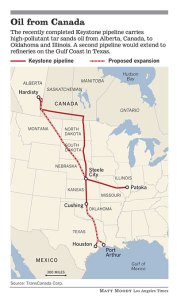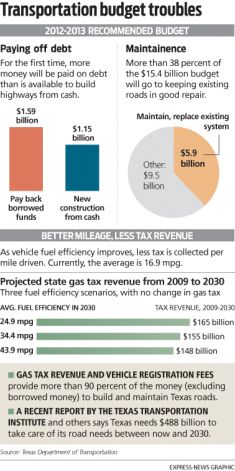Word of the Comptroller’s Biennial Revenue Estimate (full report in .pdf) spread quickly through the Texas Capitol Monday. That report was one of the biggest stories of the day because her revenue estimate became the spending ceiling for the Legislature this session. According to Comptroller Comb’s estimates, the state has a shortfall of about $27 billion over the next two years. Some of that is the expected gap between what we’ll take in and what the state would have to spend to keep services at the current level. However, about $4.3 billion results from the amount state spending exceeded expected revenue. That demonstrates the reality that while the Texas Legislature must approve a budget that is balanced, it is still possible to run a deficit if, for example, tax revenue drops below the Comptroller’s estimate.
Figure 1 of the Comptroller’s report summarizes the basic revenue picture:
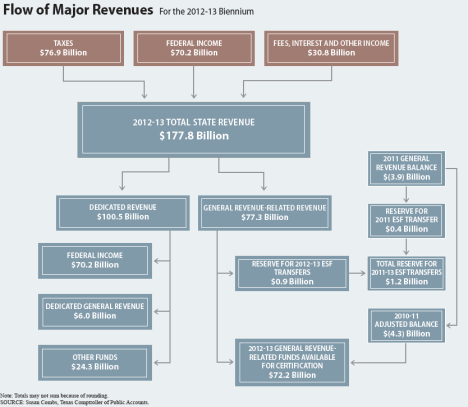
The response (so far) hasn’t been promising because very few people want to talk about how the state can deal with the shortage of money.
 Governor Perry declared the issues of eminent domain and sanctuary cities emergency items to expedite consideration of legislation on those issues (you can check out the Texas Tribune’s brief explanation of “emergency items”). Clearly, Perry is in no rush to tackle the tough choices coming. In fact, Perry plans on escaping the state several time in the next few months as he keeps himself busy not running for president.
Governor Perry declared the issues of eminent domain and sanctuary cities emergency items to expedite consideration of legislation on those issues (you can check out the Texas Tribune’s brief explanation of “emergency items”). Clearly, Perry is in no rush to tackle the tough choices coming. In fact, Perry plans on escaping the state several time in the next few months as he keeps himself busy not running for president.
The Texas Public Policy Foundation (TPPF) has attempted to declare the shortfall a myth. However, their analysis is based on silly notions that reveal why I have quit taking any of their “research” seriously. They got a well-deserve “False” on the Truth-O-Meter because want the Comptroller to toss aside factors like the state’s growing population and increased health care costs in estimating future state spending. Like similar groups on the far left, the TPPF try to get citizens to forget about real world costs in order to sell their vision. Anyone who tells you this isn’t a serious problem shouldn’t be taken seriously.
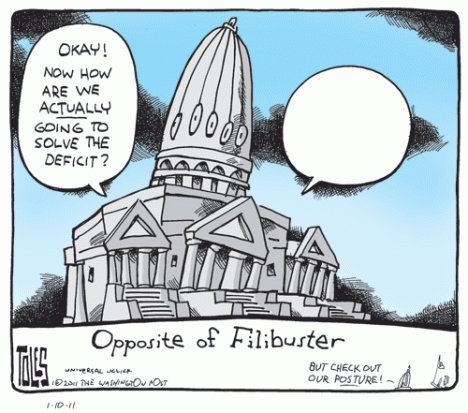
So, the situation in Austin is very much like the situation in Washington, DC (maybe worse). Everyone wants to talk about the problem–no one is ready to talk about solutions.
One of the people in the Texas Capitol willing to talk realistically about the issue. Senator Steve Ogden (Republican-Bryan) was elected president pro tempore of the Texas Senate and spoke directly to the tough decisions ahead. As Paul Burka pointed out in “Day One: A Tale of Two Styles,” Ogden will probably serve another term as chair the Senate Finance Committee. Texas desperately needs leadership on the budget and Ogden seems ready to address the budget shortfall in realistic terms.
In an interview with the Texas Tribune, House Appropriations Chairman Jim Pitts (R-Waxahachie) said that he is going to propose a budget soon. That budget will be based on no new taxes and not tapping into the state’s “rainy day fund.” His idea is to specify the tough choices facing Texas in hopes of getting legislators to start thinking about the implications of every cut. Pitts should be credited with having the courage to talk about specific cuts and move the state toward a constructive dialog.
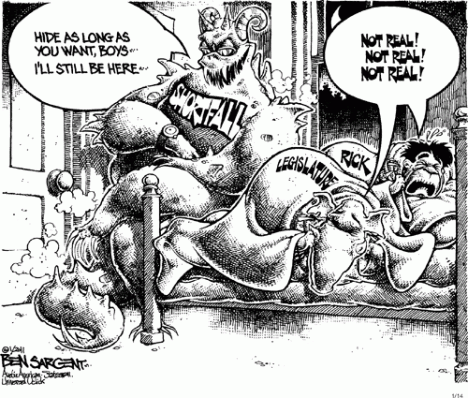
The leadership out of Austin between sessions contributed to the state’s problems. For example, by the time that universities received word in December of 2010 on the 2.5% reduction, spring classes were set and students were enrolled in the classes. That effectively mandated that most savings be through summer courses. Had state leaders been more forthcoming or less timid, better planning would have allowed more effective savings. Decisions fall to bureaucrats when elected officials delay and avoid tough decisions. This isn’t always a bad thing. It may be best to leave decision about the cuts in priorities in the hands of others. However, claims of “leadership” should be backed up occasionally with real decisions. Such was not the case. However, now that Ogden and Pitts have stepped up, Texas may be ready to move ahead.
Filed under: Fiscal Policy, The Executive Branch, The Legislature | Tagged: Jim Pitts, Steve Ogden | Leave a comment »


